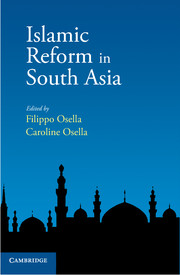Book contents
- Frontmatter
- Contents
- List of Contributors
- Introduction
- Part I Reformist Journeys
- Part II Debating Reform
- 5 The Enemy Within: Madrasa and Muslim Identity in North India
- 6 Islamism and Social Reform in Kerala, South India
- 7 Piety as Politics Amongst Muslim Women in Contemporary Sri Lanka
- 8 The Changing Perspectives of Three Muslim Men on the Question of Saint Worship over a 10-Year Period in Gujarat, Western India
- 9 Women, Politics and Islamism in Northern Pakistan
- 10 Violence, Reconstruction and Islamic Reform: Stories from the Muslim ‘Ghetto’
- Part III Everyday Politics of Reform
- Part IV Reform, State and Market
- Index
9 - Women, Politics and Islamism in Northern Pakistan
from Part II - Debating Reform
Published online by Cambridge University Press: 05 January 2014
- Frontmatter
- Contents
- List of Contributors
- Introduction
- Part I Reformist Journeys
- Part II Debating Reform
- 5 The Enemy Within: Madrasa and Muslim Identity in North India
- 6 Islamism and Social Reform in Kerala, South India
- 7 Piety as Politics Amongst Muslim Women in Contemporary Sri Lanka
- 8 The Changing Perspectives of Three Muslim Men on the Question of Saint Worship over a 10-Year Period in Gujarat, Western India
- 9 Women, Politics and Islamism in Northern Pakistan
- 10 Violence, Reconstruction and Islamic Reform: Stories from the Muslim ‘Ghetto’
- Part III Everyday Politics of Reform
- Part IV Reform, State and Market
- Index
Summary
Introduction
In Pakistan's elections of October 2002 a coalition of ‘religious parties’ was elected into government in the North West Frontier Province's provincial assembly. The political parties making up this coalition, the Muttahida Majlis-e Amal (MMA), or United Action Front, claimed during the campaign that they would introduce ‘Islamic’ or shari'a law into Pakistan's legal system. Indeed, they did quickly set to the task of ‘Islamizing’ the Frontier: playing audio music cassettes was banned in the region's public transport vehicles, for example. In the summer of 2003 I was in the Frontier conducting research in Chitral—a mountainous region that is predominantly populated by Khowar-speaking ethnically Chitrali Muslims. Chitral too had seen the victory of MMA politicians in both the provincial and national assemblies. After their election, these men issued statements saying that Chitrali women working in the offices of international development NGOs active in the region should wear the Afghan burqa to work. Many of Chitral's mullahs complained both before and after the MMA's election success that the sight of men sitting with women in plush white jeeps whilst listening to Indian music cassettes was corrupting the emotions of Chitral's Muslims. They argued in their mosque addresses that the presence ofwomen in public was a form of public indecency that rendered women prostitutes in the eyes of Islamic law. In the face of these Islamizing injunctions, several women verbally challenged the messages of Chitral's ‘hardened’ men of learning and piety (dashmanan).
- Type
- Chapter
- Information
- Islamic Reform in South Asia , pp. 230 - 254Publisher: Cambridge University PressPrint publication year: 2013



